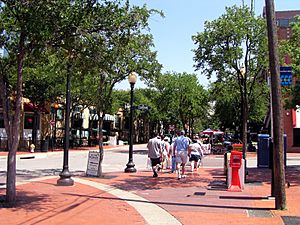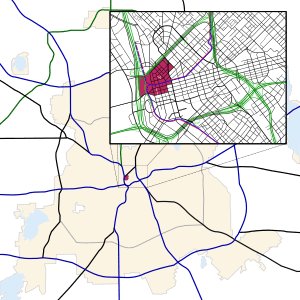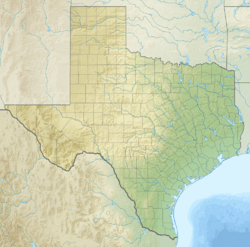West End Historic District (Dallas) facts for kids
Quick facts for kids
West End Historic District
|
|
|---|---|

Tourists in the West End stroll down Market Street
|
|

Location in Dallas
|
|
| Country | United States |
| State | Texas |
| Counties | Dallas |
| City | Dallas |
| Area | Downtown |
| Elevation | 423 ft (129 m) |
| ZIP code |
75202
|
| Area code(s) | 214, 469, 972 |
|
Westend Historic District
|
|
| Location | Bounded by Lamar, Griffin, Wood, Market, and Commerce Sts., Dallas, Texas |
| Area | 67.5 acres (27.3 ha) |
| Built | 1891 |
| Architect | Multiple |
| Architectural style | Chicago, Late 19th and Early 20th Century American Movements, Romanesque |
| NRHP reference No. | 78002918 |
| Significant dates | |
| Added to NRHP | November 14, 1978 |
The West End Historic District in Dallas, Texas, is a special area known for its history. It covers about 67.5 acres in the northwest part of downtown. This district is generally located north of Commerce Street, east of I-35E, west of Lamar Street, and south of Woodall Rodgers Freeway.
It is surrounded by other interesting parts of Dallas. To the south, you'll find the Government and Reunion districts. To the north is Victory Park. The Arts, City Center, and Main Street districts are to its east.
A section of the West End Historic District is officially recognized on the U.S. National Register of Historic Places. This means it's a place with important historical buildings and stories. A smaller part is also a Dallas Landmark District, which gives it even more protection. The far western side of the district is part of the Dealey Plaza Historic District. This area is famous for its connection to the Assassination of John F. Kennedy.
Contents
History of the West End
Early Beginnings
The West End area started as a simple trading post. This was set up by a man named John Neely Bryan. A trading post was a place where people could buy, sell, and trade goods.
In July 1872, something big happened: the Houston & Texas Central Railroad arrived in downtown Dallas. This was a game-changer! The railroad made it easy to move goods. Because of this, many manufacturing companies came to the area. They built large warehouses to store their products. These brick warehouses became a key part of the West End's look.
A Time of Change
The district became very well-known in the 1960s. This was because President John F. Kennedy was in a parade through Dealey Plaza when he was assassinated. This sad event brought a lot of attention to the West End.
However, even with the attention, the district faced challenges. Many businesses started moving out of the city center. They preferred new locations in the suburbs. This made the West End's economy struggle.
Bringing History Back to Life
As downtown Dallas grew, older buildings were often torn down. But one local developer, Preston Carter Jr., wanted to save the West End's history. In June 1976, he started working to bring the area back to life.
Old warehouses and other brick buildings were given a new purpose. They were turned into fun restaurants and shops. This helped preserve the unique look of the district. In November 1978, the West End Historic District was officially added to the National Register of Historic Places. This was a big step in protecting its past.
The West End Today
Today, the West End is a very popular place for tourists. Millions of people visit it every year. It's one of Dallas's top attractions.
However, the area has seen some changes recently. For example, the West End Marketplace, which was a large shopping and entertainment complex, closed in 2006. But there's hope for the future! New developments in nearby Victory Park might help the West End become even more lively again.
Places to Visit
The West End Historic District is home to several interesting attractions:
- John Fitzgerald Kennedy Memorial: A monument dedicated to President John F. Kennedy.
- Old Red Museum: This museum is in a beautiful old courthouse. It tells the story of Dallas County.
- Dallas World Aquarium: A fun place to see amazing sea creatures and animals from around the world.
- Dallas Holocaust Museum/Center for Education & Tolerance: A museum that teaches about the Holocaust and promotes understanding.
- The Sixth Floor Museum: Located in the Texas School Book Depository building. This museum tells the story of President John F. Kennedy's assassination and its impact.
Getting Around
Public Transportation
The West End is easy to reach by public transport.
- DART trains serve the area. You can use the Blue, Red, Green, and Orange lines.
- The main station is West End Station.
Education
The schools in the West End district are part of the Dallas Independent School District.
Depending on where they live, students in the district go to different schools:
- Students living south of Pacific Street attend City Park Elementary School, Billy Earl Dade Middle School, and James Madison High School.
- Students living north of Pacific Street attend Hope Medrano Elementary School, Thomas J. Rusk Middle School, and North Dallas High School.
Images for kids





